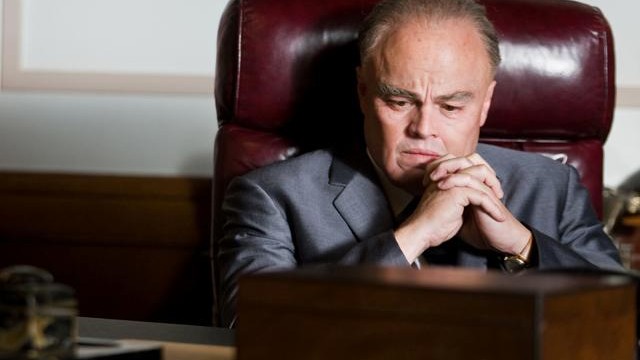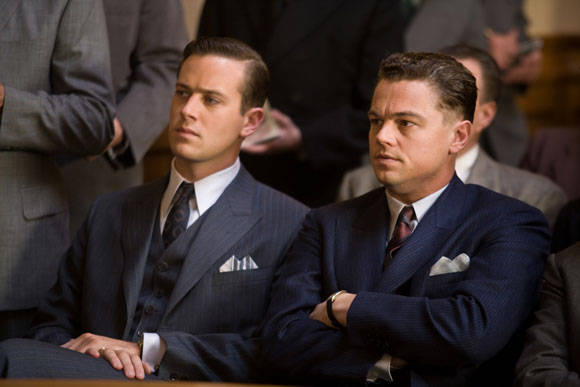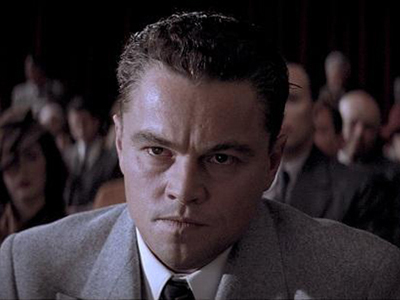J. Edgar (2011)
DIRECTOR: Clint Eastwood
CAST:
Leonardo DiCaprio, Armie Hammer, Judi Dench, Naomi Watts
REVIEW:
During his forty-eight-year reign as director of the FBI, John Edgar Hoover was regarded by many as the most powerful man in America. During his lifetime, the publicity-savvy “J. Edgar” was a subject of widespread national admiration as he presided over crackdowns on political radicals and Prohibition-era outlaws, organized and updated the Bureau into an efficient and state-of-the-art crimefighting force with modern scientific methods that are still used today, and led the investigation into the Lindbergh baby kidnapping. Yet after his death in office in 1972, more facts came to light about Hoover’s less savory behind-the-scenes machinations: his excesses of FBI power, his blackmail of US Presidents and government officials, his vendetta against Martin Luther King, and the extent to which some of his most lauded accomplishments were exaggerated, sometimes grossly distorted, or outright invented by Hoover himself. Today Hoover is viewed in substantially more ambivalent, often even negative light than during his lifetime, and FBI directors are limited to one ten-year term due in large part to the prodigious length and controversy of his tenure. With this many decades of history and historical events to play with and a figure of this much complexity and moral ambiguity, director Clint Eastwood and screenwriter Dustin Lance Black had a rich tapestry to work with, but J. Edgar‘s dry, relentlessly low-key tone can make it a challenge to sit through for all but those with a strong fascination with the subject matter. However, despite the biopic’s overlong running time and sluggish pace, the period details are impeccable, and the central character is a complicated enough man to be worth a dedication of time and attention for those willing to make the effort.
J. Edgar splits its narrative between the “present” in the ’60s and ’70s with the elderly Hoover (Leonardo DiCaprio, first unrecognizable beneath heavy age makeup) dictating his self-aggrandizing and not necessarily 100% truthful memoirs to a series of young FBI agents while using secret files and wiretaps to blackmail the Kennedys and harass Martin Luther King, and flashbacks to the ’20s and ’30s with the young Hoover rising through the ranks of the Bureau of Investigation (he added the “Federal” in the 1930s) through his relentless pursuit of Communist radicals, real and imagined, and his pursuit of bank robbers like John Dillinger and Alvin Karpis. With the help of his quietly efficient secretary Helen Gandy (Naomi Watts), who will remain at his side through his entire forty-eight years as director, he also amasses secret files of blackmail material on everyone from Senators to Presidents to defend his position and push for expanded powers. Along the way, he investigates the kidnapping of the infant son of famed aviator Charles Lindbergh (Josh Lucas), hob knobs with Ginger Rogers (Jamie LaBarber), her mother Lela (Lea Thompson), and Shirley Temple (Emily Alyn Lind), butts heads with Bobby Kennedy (Jeffrey Donovan), and finally meets Richard Nixon (Christopher Shyer), who finally proves too much for Edgar to control, and terrifies the Bureau chief into thinking he intends to raid his secret files. Throughout Edgar’s life and career, two people are huge influences. The first is his stern, Bible-thumping mother Anne (Judi Dench), who exhorts him to be strong and a “real man”. The second is Clyde Tolson (Armie Hammer), who despite virtually completely lacking the stringent qualifications Hoover demands of everyone else, quickly becomes Edgar’s right hand man, with whom he forms an intensely close emotional (romantic?) relationship that spans the next forty-eight-years.
The biggest strength of J. Edgar is that it’s biographing a man who lived so long, did so much, and lived through and was directly or indirectly involved in so many historical events. The biggest weakness of the movie is how low-key, downright placid it is about all of this. Clint Eastwood has always directed movies that move at their own deliberate pace and refuse to rush things along, but too often J. Edgar feels as dry as a history book. It’s a textbook “Greatest Hits” depiction of his life and a standard-issue biopic that touches on all the expected points–his obsession with Communists, the Lindbergh baby kidnapping, his crackdown on the Prohibitian-era bank robbers, his adversarial relations with the various Presidents he served under, his dislike of Martin Luther King, and the ambiguous nature of his relationship with Clyde Tolson–but without injecting much color or passion. Its straightforward, staid tone can make sizable portions of J. Edgar a chore to sit through. There are two areas where the movie generates intrigue. The first is depicting Hoover’s rise to power through public crackdown on crime and private arm-twisting, threatening FDR with files on Eleanor Roosevelt’s alleged lesbian affair, waving transcripts of JFK’s dalliance with an East German Communist under Bobby Kennedy’s nose, and placing Senator McKellar under surveillance after the politician humiliates him at a Congressional hearing by cornering Hoover into admitting that he has never personally arrested anyone (incidentally, this same scene was also shown onscreen in Public Enemies, starring Johnny Depp as John Dillinger and with Billy Crudup as Hoover). Hoover holds media-savvy speeches railing dramatically against the threat posed to America by foreign radicals necessitating granting ever-increasing powers to his Bureau of Investigation, and even doggedly ferrets out a loophole to deport an American citizen, anarchist Emma Goldman. At times, Edgar’s manic relentlessness is almost darkly amusing, as are his towering standards for FBI agents (he dismisses one long-serving agent because he refuses to shave his mustache).
The other strongest focal point, and indeed the closest the film has to a heart, is Hoover’s fascinatingly ambiguous relationship with Clyde Tolson. Eastwood does not shy away from the homosexual undertones, and he’s working off a script by Dustin Lance Black, who won an Oscar for his screenplay for the Harvey Milk biopic Milk, but while, like Harvey Milk, J. Edgar Hoover was (probably) a homosexual, he landed on a polar opposite end of the spectrum. While Harvey Milk was an out-and-proud activist, Hoover is so deeply buried in the closet that he may well never admit that he is gay even to himself. He is a hopelessly repressed mama’s boy, haunted and dominated by her cold declaration that she would rather have a dead son than a gay one, never fully escaping her domineering influence even after her death. In fact, while the films and the characters’ lives are completely different, I was fleetingly reminded of Heath Ledger’s Ennis del Mar from Brokeback Mountain; Ledger and DiCaprio have the same way of playing a repression so deep that it manifests physically in squirming, awkward men who seem to guard every word so carefully that they can barely get it out, and never look comfortable. Playing such a guarded, repressed character, DiCaprio sometimes says more with body language than words; watch how sweaty and stammering he gets when he first meets Clyde. Having repressed his sexuality and denied it, probably even to himself, his entire life, it shakes and frightens him to meet someone he’s so strongly attracted to, who loosens the lid he keeps on himself. A much later crucial scene in a hotel room finally brings the sexual tension between them to the surface. Hoover tosses around the idea of marrying actress Dorothy Lamour, whom he’s been seeing socially, and Tolson’s emotional explosion, tearfully calling Edgar a “horrible, heartless little man” and smashing glasses against the wall, removes any lingering doubt about at least his side of the relationship, especially when their argument turns into a fistfight that ends with them wrestling on the floor until Tolson manages to pin Edgar and passionately kisses him. “Don’t ever do that again,” a flustered Edgar snaps, and waits until the door closes and he is alone before brokenly whispering “I love you, Clyde”. Of course, this is all speculative, as no one knows what really went on in behind the closed doors of their adjoining rooms, but it is fact that Hoover and Tolson took their daily meals together and vacationed together, were both lifelong bachelors, and that Hoover left his house and belongings to Tolson, who received the flag from Hoover’s coffin upon his death. As depicted in the film, they are a couple emotionally but celibate physically, more due to Hoover than Tolson. Aside from his mother, Clyde is probably the one person Edgar deeply loves, but he is too repressed to ever act on it.
The single strongest element of J. Edgar, which plays no small part in holding everything together, is the central performance of Leonardo DiCaprio, who mostly succeeds in a role he might have seemed like a strange choice for. It takes a few minutes for DiCaprio as Hoover to click; despite his attempt at Hoover’s accent and clipped, rapid-fire speaking style, DiCaprio’s voice is still recognizable, which is a little distracting when he’s playing Hoover as an old man but still sounds like himself. Billy Crudup in Public Enemies did a more spot-on vocal impression. The age makeup is also not entirely convincing (although Hoover’s is much better than Tolson’s, which makes him look unintentionally silly and like he’s practically mummified), and DiCaprio’s mimicking the slow movements and posture of an older man at first seem like he’s trying too hard. But DiCaprio forges onward with intensity and conviction, and within a few minutes, we’ve accepted him as J. Edgar Hoover, both young and old. While Hoover generated passionate admiration and loathing in equal measure, the film takes what seems to me to be a fair and balanced approach that shows the man’s various character flaws and less-than-noble actions but also does not give him horns and a forked tail. When we meet him, he is driven by a paranoid fixation with Communists and socially hopelessly awkward; his idea of a “date” with secretary Helen Gandy consists of showing off how fast he can find a title in his new filing system. He is thin-skinned and sometimes petty, jealous of Agent Melvin Purvis for taking down Dillinger and stealing his spotlight to the point that he vindictively railroads his career and taking even mild criticism of the Bureau like a vicious personal attack and placing the critic under FBI surveillance. Late in life, he fosters an irrational hatred of Martin Luther King, who he calls the most dangerous man in America, to the point of forging a letter from a black civil rights activist calling King a fraud and suggesting he commit suicide, with a reckless vehemence that alarms even the ever-faithful Clyde. He is an unreliable narrator of his own life, with the movie showing many events from his life the way he details them to his biographer and then giving us a late scene in which Clyde calls him out on all the self-glorifying distortions in what we just saw. An early scene shows Hoover personally arresting Alvin Karpis, but the second version much later accurately shows other agents making the arrest and Hoover conveniently swooping in just to time to hoist Karpis up in front of the cameras. His conversation with Charles Lindbergh is also blown out of the water, as it turns out Lindbergh refused to even meet Hoover. In his own mind, Hoover is the unappreciated hero of his own story, relentlessly waging a one-man fight against overwhelming odds, opposed by everyone around him (except Clyde, and sometimes even him). The way he views himself and the way he actually is might not jive, but there’s something almost pitiable about his misguided earnestness. As he has his failings, so does he have his virtues, and there are moments (his scenes with Clyde, and when his attempt at a “coming out” is coldly shot down by his mother) when we pity him more than dislike him.
Other than DiCaprio and Armie Hammer, who is solid and has a couple exceptionally strong moments (the hotel room scene) as Clyde Tolson, no one else has much to do. Naomi Watts, like DiCaprio and Hammer donning age makeup to play her character over nearly fifty years, appears regularly but does nothing besides dutifully organize Edgar’s files. It’s only in two scenes, one where she is too disturbed by his forged letter to Martin Luther King to silently sit and type it out, and another where she loyally carries out her boss’ dying wish and shreds his secret files before Nixon’s henchmen can get their hands on them, that she shows a flicker of what she’s really thinking. Judi Dench spends much of her screentime laying sick in bed, and only makes an impression with her icy “I’d rather have a dead son than a daffodil” comment, where she puts her trademark stern demeanor to chilling effect. Various more-or-less recognizable faces are scattered throughout to more-or-less believable effect, including Josh Lucas (as Charles Lindbergh), Stephen Root (as a wood expert who helps Hoover find the Lindbergh baby’s kidnapper), Dermot Mulroney (as Colonel Schwarzkopf, in charge of the investigation into the baby’s kidnapping and father of General Norman Schwarzkopf), Zach Grenier (as a go-between from Lindbergh to the kidnapper), Lea Thompson (as Ginger Rogers’ mother), Jeffrey Donovan, star of the television series Burn Notice (as Bobby Kennedy), and Christopher Shyer (as Nixon), but these are all background filler who don’t make individual impressions, and vary in effectiveness. Donovan is adequate as Bobby Kennedy, while Christopher Shyer is unconvincing as Nixon, neither looking nor sounding like him, as is Emily Alyn Lind as Shirley Temple.
Taken as a whole, J. Edgar is a technically well-made production with impeccable period details whether it’s depicting the 1930s or 1970s, , but somewhat colorless, both literally (Eastwood films it in desaturated tones) and figuratively, and workmanlike. Its low energy and lack of a central drive provides a burden that DiCaprio’s exceptional lead performance, solid support from Hammer, and sporadic intriguing segments can only do so much to alleviate. The lead character holds fascination for biographers or those with an interest in the behind-the-scenes personalities of (in)famous historical figures, but J. Edgar holds no chance of mainstream box office success. Crowds will not flock to a dry, lengthy biopic of the late director of the FBI (in the theater I viewed it in, my friend and I were the only two people in attendance). For a history buff, a fan of period films or biopics, or someone with an interest in J. Edgar Hoover or the FBI, there are things to appreciate about J. Edgar, but those who can’t claim any of the above are likely to find it an uninspiring chore to sit through.
**1/2


